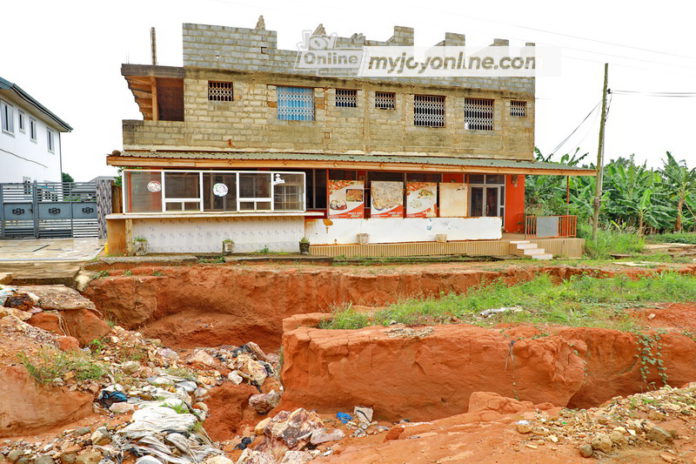Welcome to Bortianor in the Ga South municipality of Ghana’s capital, Accra – and if you have never been here, you may as well double up, for a day comes in the soon future when this iconic community – a microcosm of everything Ghanaian, will cease to exist.
Poor and dangerous roads, perennial flooding which is compounded by inadequate drains, plus structures flung just about anywhere – on waterways, dumpsites, hilltops, valleys – have rendered the community a gully town.

There is the imminent threat of chaos everywhere one turns. Buildings are on their knees – on the verge of collapse, with their owners too helpless. The waiting disaster is way beyond them.

The floods have dug gullies and trenches virtually under every building and left these concrete structures precariously stilting about in this densely populated community, one in the Ngleshie-Amanfro constituency – a hotbed for political activities in election years.
Some even think the constituency is a swing one – for the nation’s two largest parties – the NDC and NPP, have been handed the nod to hoist their flags here.

A recent short video of some Bortianor (Adansiman) residents accessing their homes by descending down and climbing up long ladders that sit in a gully that qualifies for a storm drain, sent ace photojournalist David Andoh on a search for what is going on.
And what he discovered – as told by the photographs he returned with – points to the fact that Bortianor is not losing only its shine, but its soul also.

Residents claimed a number of school children have died in flash floods following heavy rains. Walls have been eroded at the Red Top-Abuom and Aplaku suburbs, roads eaten away, and foundations of buildings exposed.
Planks that may cave in under heavy weights litter the community and link up with shops where one may buy supplies. But the entire picture is unsightly and unhealthy, as a result of which many property owners have abandoned their investments.
Bortianor is the same community that is home to the popular West Hills Mall, the manufacturing group Zonda International and the Finny Fertility Hospital. Where these businesses sit is unaffected by the climate devastation though.
Ordinarily, it is a preferred choice for prospective middle and upper class citizens, largely as a result of the serene weather and the greenery. The undulating topography adds its own beauty.
But that beauty is slipping away. Some residences are being cut off from their immediate surroundings.
What used to be a majestic 3-storey building at Baba Dogo, a suburb, is now ghostly trapping, and typifies the degradation that years of lack of planned development have wrecked in Accra’s backyard.
The entire Bortianor enclave falls under Accra’s earthquake zone, and the haphazard development, rather than planned, coordinated and supervised development, cannot continue.
Some of the residents claimed their pleas to authorities to come to their aid have yielded no results, so school children trek between these traps of roads and planks and hanging structures to go to school from Monday to Friday.

The stories sound so familiar, almost a chorus. Kobina Mensah Odoom bemoans the loss of a road in front of his house, previously available to both commercial and private drivers but now impassable.
Many are residents who must park their cars at distant places on a daily basis and make the rest of the journey in and out on foot.
Every rainfall worsens the situation. And in the past few months, the rains have been heavy and so has been the destruction.

Amelia, owner of Insha Allah Food Joint at Broadcasting Alhaji Junction said her customers risk a lot to patronise her joint, and sometimes the risks deter them, especially when it rains.
Richard Bulley resides in a severely affected house close to Old Bortianor-Kokrobite road at Aplaku who is disappointed at city authorities’ failure to respond to calls for help.
He said they tried constructing a wall around the house to save the situation but the volume of water which passes through the place destroyed the initial work.

Kwadwo Okordieh, a welder at Red Top JB complained about how erosion is fast driving him out of business. The road in front of his workshop that leads to J.B. Last Stop has been closed as a result of the deep gullies so no one sees his handiwork anymore.
Akwasi Agyapong, a resident of Broadcasting near the Light House Church recounted how running water from a deep gully collapsed another resident’s fence wall and killed one person in the process.
Bismarck Gyan, a resident of Red Top said he spent huge sums of money to buy gravels and cement to fill a damaged road by his house, however, the fast running water from the gullies washed away everything.

According to Mr Gyan officials from the Ga South Municipal Assembly have been visiting the community but nothing has come out of the visits.
In an interview with the Ga South Municipal Chief Executive, Mr Joseph Nyarni Stephen, he said he led a team of Urban Roads Engineers to the community to assess the situation to enable the assembly to find solutions to the problems.
He asked the residents to be patient, adding that in the coming weeks the assembly will start work in the community to make sure the problems are resolved.






























